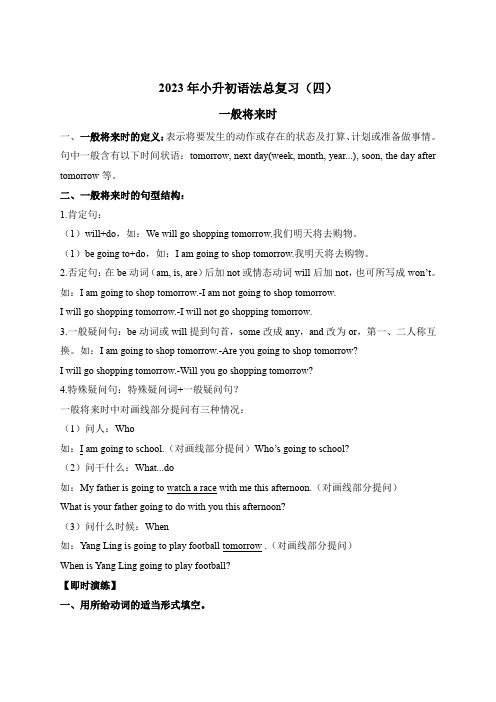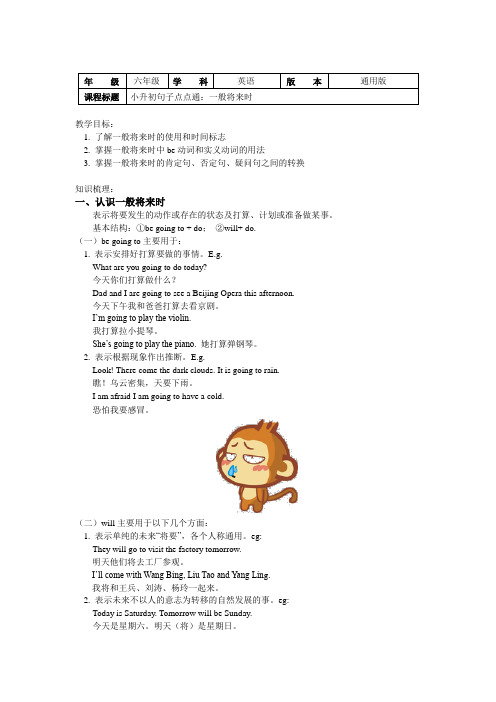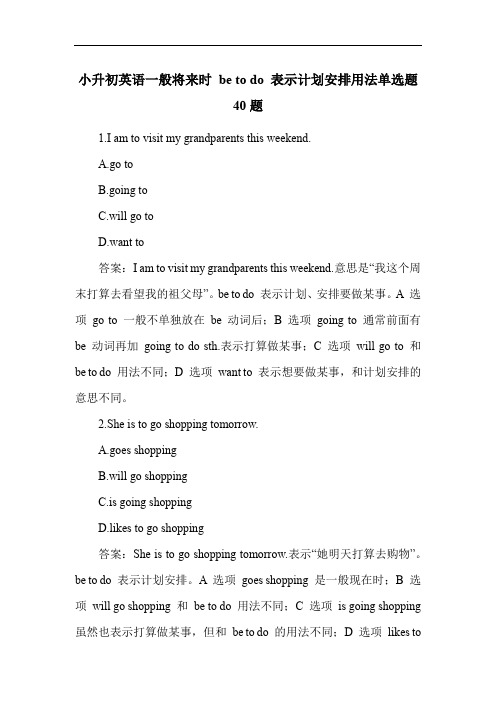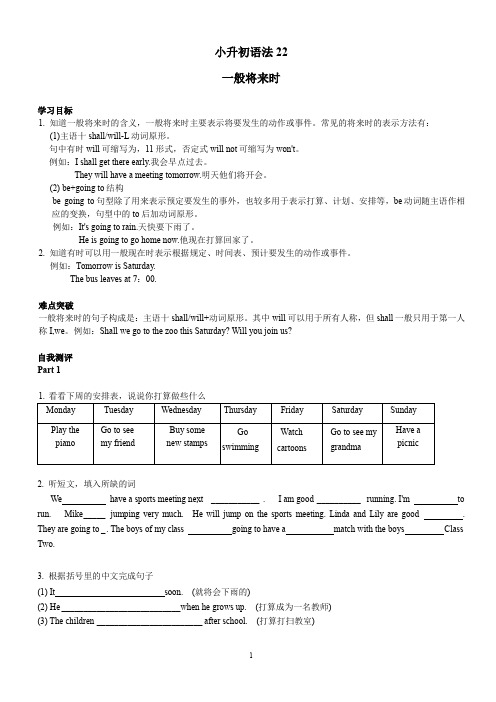英语小升初一般将来时
小升初英语一般将来时

D. will doing
Summary
1.定义:一般将来时表示将来某一时段的动作或状态。 2.结构:主语+will/shall+动词原形+其他成分
主语+be going to+动词原形+其他成分 主语+be+动词-ing形式+其他成分 there is/are going to +动词原形或there will +动词原形
S1h.表al示l一将般来用某于一第时一刻人的称动作,或wi状ll可态以。 用2.将于来所某有一人段称时。间内经常的动作或状态。
肯定句:主语+will/shall+动词原形+其他成分 I will / shall go to visit him next week. 下周我将去拜访他。
否定句:主语+will/shall+not+动词原形+其他成分 I will / shall not go to visit him next week.
火眼金 睛
1.We are going to grandparents tomorrow. 加visit 2. She going to go soon. 加is 3. He is go to read books this evening. 改going 4. My parents is going to Beijing next week. 改为are 5. John are going to the park. 改为is
一、单项选择。
( c) 1. There __________ a meeting tomorrow
afternoon.
A. will be going to
小升初(PEP)英语专题考点讲解 一般将来时

和他出现的朋友还有: this morning, this afternoon, this evening, at night, tomorrow, this weekend, next week, soon等表示将来 时间的词语。
一、单项选择。
fternoon.
2.She is not going to watch TV this afternoon. 今天下午她不打算看电视。
3.We are not going to the cinema at night. 我们今晚不看电影。
二、一般疑问句 在一般疑问句中,它的模样是: Be(am/is/are)+主语+going to +动词原形+其它? 如:
3.They are going to visit their teacher tomorrow. 他们明天要去看望他们的老师。
陈述句(否定句) 在否定句中,它的模样是: 主语+be(am/is/are)+not going to +动词原形+其它。如:
1.I am not going to play football after school. 放学后我不打算踢足球。
一般将来时
Hi,大家好!今天向大家介绍一位爱展望未来的小精灵 be going to/will。它出生在“一般将来时”家族里。表示将 来某个时间将要发生的动作或存在的状态。
看“be going to”长得多魁梧,它由三个词组成。这 三个词分开来都有自己的意思。但组合在一起,只表示“打 算 , 将 要 ” 。 其 中 “ be” 会 根 据 主 语 的 人 称 变 化 派 出 “am,is,are”来完成任务。“to”是“不定式符号”。它有一 点小脾气,跟在它后面的动词必须是动词原形。
2023年小学英语六年级小升初语法总复习(四)一般将来时 (译林版含答案)

2023年小升初语法总复习(四)一般将来时一、一般将来时的定义:表示将要发生的动作或存在的状态及打算、计划或准备做事情。
句中一般含有以下时间状语:tomorrow, next day(week, month, year...), soon, the day after tomorrow等。
二、一般将来时的句型结构:1.肯定句:(1)will+do,如:We will go shopping tomorrow.我们明天将去购物。
(1)be going to+do,如:I am going to shop tomorrow.我明天将去购物。
2.否定句:在be动词(am, is, are)后加not或情态动词will后加not,也可所写成won’t。
如:I am going to shop tomorrow.-I am not going to shop tomorrow.I will go shopping tomorrow.-I will not go shopping tomorrow.3.一般疑问句:be动词或will提到句首,some改成any,and改为or,第一、二人称互换。
如:I am going to shop tomorrow.-Are you going to shop tomorrow?I will go shopping tomorrow.-Will you go shopping tomorrow?4.特殊疑问句:特殊疑问词+一般疑问句?一般将来时中对画线部分提问有三种情况:(1)问人:Who如:I am going to school.(对画线部分提问)Who’s going to school?(2)问干什么:What...do如:My father is going to watch a race with me this afternoon.(对画线部分提问)What is your father going to do with you this afternoon?(3)问什么时候:When如:Yang Ling is going to play football tomorrow .(对画线部分提问)When is Yang Ling going to play football?【即时演练】一、用所给动词的适当形式填空。
(完整)小升初英语一般将来时

一般将来时1、定义:一般将来时表示将来某个时间要发生的动作或存在的状态2、结构:主语+will\shall\be going to+v(动词原形)+其他例如:It is going to rain. 要下雨了。
We are going to have a meeting today. 今天我们准备开一个会。
Tomorrow will be Sunday. 明天就是星期天。
The rain will stop soon. 雨很快就要停了。
I shall not go. 我不准备去了。
What shall we do for summer holiday?暑假我们做什么呢?注意:a.will用于所有人称,shall用于第一人称(we.I)b. will 常简略为'll,并与主语连写在一起,如:I'll,he'll,it'll,we'll,you'll,they'll。
c. 一般疑问句如用will you…?其简略答语须是Yes,I will 或No,I won't;3、时间标志:常常和表示将来的时间状语连用。
如:tomorrow(明天),next week(下周),from now no(从现在开始),in the future(将来),soon, in 2015, in two days(两天之后)等。
四种句式:1. be going to +动词原形1.肯定句主语+be(am /,is,/ are) going to +动词原形+其它My sister is going to learn English n ext year. 我姐姐准备明年学英语。
2.否定句主语+be(am / is / are)not going to +动词原形+其它I am not going to(go to)the cinema tonight. 我今天晚上不打算去看电影。
小升初英语一般将来时be going to与will用法单选题40题

小升初英语一般将来时be going to与will用法单选题40题1. I ______ play football tomorrow.A. am going toB. willC. amD. was答案:A。
本题考查一般将来时的用法。
“be going to”表示计划、打算做某事,通常有某种迹象表明要发生某事;“will”表示单纯的将来,没有事先计划。
根据题意,“我明天打算踢足球”,有计划的意味,所以用“am going to”,B 选项“will”没有体现出计划,C 选项“am”时态不对,D 选项“was”是过去式,不符合明天的语境。
2. They ______ have a picnic this weekend.A. am going toB. willC. are going toD. were答案:C。
“they”是复数,be 动词用“are”,A 选项“am going to”用于第一人称I,B 选项“will”没有体现出计划,D 选项“were”是过去式,不符合本周末的语境。
所以选C,“are going to”表示他们本周末打算去野餐。
3. My sister ______ visit her friend next week.A. is going toB. willC. was going toD. is答案:A。
“next week”表明是将来的时间,“my sister”是第三人称单数,用“is going to”,B 选项“will”没有体现出计划,C 选项“was going to”是过去将来时,不符合,D 选项“is”时态不对。
所以选A,意思是我姐姐下周打算拜访她的朋友。
4. We ______ see a film tonight.A. are going toB. willC. wereD. are答案:B。
“tonight”今晚,A 选项“are going to”表示有计划,此处没有强调计划,用“will”更合适,C 选项“were”是过去式,D 选项“are”时态不对。
小升初英语一般将来时 will 和 shall 区别单选题40题

小升初英语一般将来时will 和shall 区别单选题40题1.I ____ play football tomorrow.A.willB.shallC.canD.may答案:A。
本题中,“tomorrow”表明是将来的时间,“will”和“shall”都可以表示将来,但在一般情况下,“will”用于所有人称,而“shall”通常只用于第一人称(I 和we),且用于比较正式的场合或提出建议。
这里是一般的陈述句,用“will”更合适。
“can”表示能力,“may”表示可能,不符合题意。
2.We ____ go to the park this weekend.A.willB.shallC.mustD.should答案:A。
“this weekend”是将来的时间,“will”和“shall”都可表将来,对于“We”,“will”更常用。
“must”表示必须,“should”表示应该,与将来时间不对应。
3.My brother ____ visit me next month.A.willB.shallC.wouldD.should答案:A。
“next month”是将来时间,“will”用于所有人称表将来,“shall”一般不用于第三人称。
“would”是“will”的过去式,“should”表示应该,不符合语境。
4.I ____ help you with your homework after school.A.willB.shallC.mustD.can答案:A。
“after school”是将来的时间,“will”表将来,“shall”不用于此语境。
“must”必须,“can”能,不符合帮助做作业的语境。
5.She ____ come to the party if she has time.A.willB.shallC.mustD.should答案:A。
“if she has time”表明是将来的情况,“will”表将来,“shall”不用于第三人称。
2020年小升初英语总复习第4章—动词和时态4:一般将来时

Monday? —Yes, they are. /No, they aren’t.
(4) 特殊疑问句:特殊疑问词+be+主语+going to+动词原形(+其他)?
2. 单项填空。
row.
A. do
B. is going
C. is going to
( B )(2)Sarah and Tom ____ the bookstore tonight.
A. are going B. are going to C. is going to
如:I’m going to visit the Great Wall with my
parents. → What are you going to do? 【注】be going to 结构中的be动词要随人称的变
化而变化,该结构一般用于表示主语主观上计划或安 排将要去做的事情。
2. will结构 (1)肯定句:主语+will+动词原形+其他. 如:I will play the ball tomorrow.
( A )(3)My mother ____ shopping next weekend.
A. is going to go B. is going C. has going to
( C )(4)Tomorrow is January 1st,we ____ a holiday.
A. have
B. is having
答案:1. Sarah is going to/will clean her room this
小升初句子点点通:一般将来时

年级六年级学科英语版本通用版课程标题小升初句子点点通:一般将来时教学目标:1. 了解一般将来时的使用和时间标志2. 掌握一般将来时中be动词和实义动词的用法3. 掌握一般将来时的肯定句、否定句、疑问句之间的转换知识梳理:一、认识一般将来时表示将要发生的动作或存在的状态及打算、计划或准备做某事。
基本结构:①be going to + do;②will+ do.(一)be going to主要用于:1. 表示安排好打算要做的事情。
E.g.What are you going to do today?今天你们打算做什么?Dad and I are going to see a Beijing Opera this afternoon.今天下午我和爸爸打算去看京剧。
I’m going to play the violin.我打算拉小提琴。
She’s going to play the piano. 她打算弹钢琴。
2. 表示根据现象作出推断。
E.g.Look! There come the dark clouds. It is going to rain.瞧!乌云密集,天要下雨。
I am afraid I am going to have a cold.恐怕我要感冒。
(二)will主要用于以下几个方面:1. 表示单纯的未来“将要”,各个人称通用。
eg:They will go to visit the factory tomorrow.明天他们将去工厂参观。
I’ll come with Wang Bing, Liu Tao and Yang Lin g.我将和王兵、刘涛、杨玲一起来。
2. 表示未来不以人的意志为转移的自然发展的事。
eg:Today is Saturday. Tomorrow will be Sunday.今天是星期六。
明天(将)是星期日。
He will be thirty years old this time next year.明年这个时候他(将)三十岁。
小升初英语一般将来时 be to do 表示计划安排用法单选题40题

小升初英语一般将来时be to do 表示计划安排用法单选题40题1.I am to visit my grandparents this weekend.A.go toB.going toC.will go toD.want to答案:I am to visit my grandparents this weekend.意思是“我这个周末打算去看望我的祖父母”。
be to do 表示计划、安排要做某事。
A 选项go to 一般不单独放在be 动词后;B 选项going to 通常前面有be 动词再加going to do sth.表示打算做某事;C 选项will go to 和be to do 用法不同;D 选项want to 表示想要做某事,和计划安排的意思不同。
2.She is to go shopping tomorrow.A.goes shoppingB.will go shoppingC.is going shoppingD.likes to go shopping答案:She is to go shopping tomorrow.表示“她明天打算去购物”。
be to do 表示计划安排。
A 选项goes shopping 是一般现在时;B 选项will go shopping 和be to do 用法不同;C 选项is going shopping 虽然也表示打算做某事,但和be to do 的用法不同;D 选项likes togo shopping 表示喜欢去购物,不是计划安排。
3.We are to have a picnic next Sunday.A.will have a picnicB.are having a picnicC.have a picnicD.want to have a picnic答案:We are to have a picnic next Sunday.意为“我们下个星期天打算去野餐”。
小升初英语语法句型转换-一般将来时(全国通用版)

am going to go
will go
1.I am tired. I __________
(go) to bed early
tonight.
2.Mary’s birthday is next Monday. Her brother
_____________(give)
her a present.
(2)否定句:
主语+ be + not going to +动词原形+其他.
如:
I am not going to plant trees this weekend. 这个周
末我不打算去种树。
They aren’t going to climb mountains this week.
这周他们不打算去爬山。
下周你们要去做什么?
—We will have a picnic in the park.
我们将去公园野餐。
一般将来时的用法
1. 时间标志词:
1⃣️tomorrow系列
2⃣️next系列
3⃣️in the future
4⃣️in+一段时间 等表示将来的时间状语。
如:
We will go to Shanghai next week.
week.(改否定)
won’t
go
Shirley ____ ____ to visit her grandma next
week.(改否定)
练习
We will hold a meeting this evening.(改一般疑
问句)
you
Will
____ ____ hold a meeting this evening?
专题10 一般将来时_备战2021年小升初英语必考语法和题型(解析版)

专题10 一般将来时一、一般将来时的概念一般将来时表示将来某个时间要发生的动作或存在的状态。
如:I am going to play football tomorrow.我明天打算去踢足球。
Amy will be 12 years old next year. 艾米明年计12岁了。
There will be a football match in our school next week. 我们学校下周将举行一场足球比赛。
二、一般将来时的动词结构①主语+be going to + 动词原形+其它。
②主语+will + 动词原形+其它。
三、一般将来时的句式结构1. 含有be going to的句型(1) 肯定句:主语+ be going to +动词原形+其他。
如:I'm going to have a picnic this afternoon. 今天下午我将要去野餐。
(2) 否定句:主语+be+ not going to +动词原形+其他。
如:I'm not going to have a picnic this afternoon. 今天下午我将不去野餐。
(3) 一般疑问句:Be +主语+ going to +动词原形+其他?肯定回答:Yes, 主语+be.否定回答:No, 主语+ be + not. 如:例:I am going to have a picnic this afternoon. 我今天下午要去野餐。
(改为一般疑问句并作回答) —Are you going to have a picnic this afternoon? 你今天下午将要去野餐吗?—Yes, I am. 是的,我要去。
—No, I’m not. 不,我不去。
(4) 特殊疑问句:特殊疑问词+一般疑问句?What are you going to do tomorrow? 你明天将要去做什么?例:Sam is going to have a birthday party this Friday. 山姆这周五将有一个生日派对。
小升初英语一般将来时 be going to 和 will 区别单选题40题

小升初英语一般将来时be going to 和will 区别单选题40题1.I ______ play football tomorrow.A.am going toB.willC.am goingD.go to答案:B。
本题考查一般将来时的用法。
A 选项“am going to”通常表示有计划、打算做某事;B 选项“will”更侧重于主观意愿;C 选项“am going”缺少“to”,不完整;D 选项“go to”是一般现在时,不符合题意。
本题中没有体现有计划地去踢足球,而是一种主观意愿,所以选B。
2.She ______ visit her grandparents this weekend.A.is going toB.willC.is goingD.goes to答案:A。
“this weekend”表明是将来的时间,A 选项“is going to”表示有计划地做某事;B 选项“will”也可以表示将来,但没有体现出计划;C 选项“is going”缺少“to”;D 选项“goes to”是一般现在时。
本题中说她这个周末要去看望祖父母,通常是有计划的行为,所以选A。
3.We ______ have a picnic if the weather is fine.A.are going toB.willC.are goingD.go to答案:B。
本题中如果天气好我们去野餐,这更多是一种主观意愿,不是有明确计划的行为,所以用“will”更合适。
A 选项“are going to”一般表示有计划;C 选项“are going”缺少“to”;D 选项“go to”是一般现在时。
所以选B。
4.He ______ buy a new book after school.A.is going toB.willC.is goingD.goes to答案:A。
放学后买新书通常是有一定计划的行为,所以用“is going to”更合适。
【专项复习】小升初英语课件-核心考点 题型专项突破:专题 04 时态 第三讲 一般将来时 全国通用版

例题精讲
【例12】句型转换 He will leave Chongqing in two days. (对划线部分提问) ______ _______ will he leave Chongqing ?
思路点拨:两天后他要离开重庆。划线部分表示时间,两天后,对其提问可 用how soon引起问句。所以可在改写后句子的空白处填写How soon。
考点二 时间标志词
tomorrow/the day after tomorrow next day/week/month/year this afternoon/evening in+一段时间 soon from now on
考点三 一般将来时will 句型
陈述句:主语+will+动词原形+其他. e.g.: I will see a fiБайду номын сангаасm tomorrow.
考点四 一般将来时的句型转换
1.当句子中有be动词时,把be动词提到句子的前面变为疑问句, 如be动词是am,要将am改为are,将I改为you; 在be动词后面加not变为否定句 e.g.陈述句: I am going to dance this evening.
疑问句: Are you going to dance this evening? 否定句: I am not going to dance this evening.
例题精讲
【例10】句型转换 They clean the classroom every day. ( tomorrow 代 every day) They _____ ______ the classroom tomorrow.
思路点拨:句意:他们每天打扫教室。这是一般现在时的句子.用 tomorrow代替every day后该用一般将来时态。 答案:will clean
小升初英语一般将来时 be to do 表示计划安排用法单选题40题

小升初英语一般将来时be to do 表示计划安排用法单选题40题1.I am to visit my grandparents this weekend.A.am to visitB.am to visitsC.am visitD.am visiting答案:A。
本题考查be to do 表示计划安排的用法。
选项A 符合be to do 的结构,be 动词后接动词不定式。
选项B 动词不定式形式错误。
选项C 和D 不是be to do 的结构。
2.She is to go shopping tomorrow.A.is to goB.is to goesC.is goD.is going答案:A。
选项 A 正确体现了be to do 的结构,表示计划安排。
选项B 错误,动词不定式形式不对。
选项C 不是be to do 的结构。
选项D 是be going to do 的结构,与本题要求不符。
3.We are to have a picnic next Sunday.A.are to haveB.are to hasC.are haveD.are having答案:A。
选项A 是be to do 的正确结构。
选项B 错误,动词不定式形式有误。
选项C 和D 不是be to do 的结构。
4.They are to play football on Monday.A.are to playB.are to playsC.are playD.are playing答案:A。
选项A 符合be to do 的结构,表示计划安排。
选项B 动词不定式形式错误。
选项C 和D 不是be to do 的结构。
5.He is to read a book in the evening.A.is to readB.is to readsC.is readD.is reading答案:A。
选项A 正确运用了be to do 的结构。
小升初英语——一般将来时

第二讲一般将来时一般将来时通常表示现在还没有发生,但将要发生的事情或动作如:It is going to rai n.要下雨了。
We are going to have a meeti ng today.今天我们准备开一个会。
Tomorrow will be Sun day.明天就是星期天。
I shall not go.我不准备去了。
What shall we do for summer holiday? 暑假我们做什么呢?语法精讲第一人称(I /we)+shall +动词原形I shall be there in five mi nutes.我五分钟后会到那里。
_________________________________________ 我们今晚去哪里?We shall probably go to Xi 'n for our holiday.我们很可能去西安度假。
2各人称单复数+ will +动词原形When will we know our test scores?我们什么时候能知道测验的分数?_______________________________________ 他明天要和他爸爸去钓鱼You will get sick if you eat too much.如果吃得太多了,你会生病的。
一般将来时的基本用法. __________________________________ /一般将来时常常和表示将来的时间状语连用。
如:tomorrow (明天),next week(下周),from now no(从现在开始),in the future(将来),soon, in 2015, in two days两天之后)等。
be going to+ do①第一人称单数(I)+ am going to + v (动词原形)+其他成分我打算今天下午去打篮球。
②第二人称单数(you)/各人称复数(we/you/they)+going to + v (动词原形)+其他成分You are going to have a pic nic with me tomorrow. 我们打算下午去爬山。
小升初英语一般将来时的用法

【导语】⼩升初是孩⼦最重要的起步⽅向,我们需要关注怎样的信息才能对孩⼦的未来有帮助呢?以下是由整理的⼩升初英语⼀般将来时的⽤法,欢迎阅读! ⼀般将来时——将来做某事 A、构成形式: (1)主语+be going to+动词原形+其他。
(2)主语+will+动词原形+其他。
B、判断依据: ⼀个句⼦中既有be动词,⼜有going、to和动词,且动词⽤的是原形,句中往往有tomorrow、soon、next week等词。
C、句型变换: She is going to have a picnic tomorrow. She isn’t going to have a picnic tomorrow. Is she going to have a picnic tomorrow? Yes, she is. / No, she isn’t. They are going to visit their grandparents next Sunday. They aren’t going to visit their grandparents next Sunday. Are they going to visit their grand parents next Sunday? Yes, they are. / No, they aren’t. 练⼀练: A、根据中⽂,完成句⼦,每空⼀词。
1)我打算明天和朋友去野炊。
I _____ _____ _____ have a picnic with my friends. 或者: I _____ have a picnic with my friends. 2)下个星期⼀你打算去⼲嘛? 我想去打篮球。
-What _____ _____ _____ _____next Monday? -I ___ _____ ___ play basketball. 或者: -What _____ you do next Monday? -I _____ play basketball. 3)你妈妈这个周末去购物吗?是,她要去买⼀些⽔果。
小升初语法22-一般将来时

小升初语法22 一般将来时(4) Their sister ________________________ tomorrow evening. (打算去购物)(5) The boy _________________________ w hen he gets a good mark. (将会开心)(6) I ; if I am free. (将去奶奶家)4. 根据所给例句,说说下列句子例: There will be a party.There is going to be a party.(1)They will have a meeting at 10 o'clock.(2)Peter is going to be a teacher next year.(3)There is going to be concert this Sunday.(4)My father will leave for Beijing tomorrow.(5)It is going to rain soon.(6)Is Mrs White going to buy a new dress?5.按实际回答问题(1) Will you go fishing tomorrow?(2) When will you go to school tomorrow?(3) Who will be your maths teacher?(4) What are you going to do on Children's Day?(5)How old will be your grandmother in 2010?6. 选择填空( ) (1) Help yourself to some fish.A. I will have some.B. Thank you.C. You will. ( ) (2) ________ Katy do some reading this evening?A. ShallB. WillC. Is going to ( ) (3) The teacher is going to tell us a story, he?A. isn'tB. shall notC. won't ( ) (4) Don't any more now.A. eatB. will eatC. going to eat( ) (5) What is he ?A. going to doB. goingC. going to ( ) (6) There a meeting next Monday.A. is going toB. wasC. will be ( ) (7) What you _________ to do in winter holiday?A. do/planB. are/planC. will/planning( ) (8) Tom will me tonight.A. telephoningB. telephoneC. telephones趣味阅读A big Indian and a little Indian are walking down the road. The little Indian is the son of the big Indian. But the big Indian isn't the father of the little Indian. Do you know their relationship?The big Indian is the little Indian's __________________ .Keys:1. 略。
小升初英语一般将来时的构成及用法

四、Revision of all forms with future meaning
(一). be going to+动词原形
1. 表示说话人根据现在已有的迹象,判断将要或即将 发生某种情况。这类句子的主语可以是人,也可是物。 例如:
We, You, …are going aren't going Are…going to
They
to work
to work
work?
2. shall/will + 动词原形
一般将来时助动词shall/will + 动词原形 (当主语第一人称时,一般用shall,shall用于第一 人称,常被will 所代替。)
❖ 对特殊疑问句要进行具体回答。
一般将来时的主要用法:
1、表示将来某一时刻的动作或状态: We shall(will) come to see you the day after tomorrow. There will be a wonderful show next week.
2、表示将来某一段时间内经常的动作或状态: The students will come and work in the lab once a week. we shall come and work in this factory every year.
例词
look play start live hope use
looked played started lived hoped used
stop stopped plan planned trip tripped
- 1、下载文档前请自行甄别文档内容的完整性,平台不提供额外的编辑、内容补充、找答案等附加服务。
- 2、"仅部分预览"的文档,不可在线预览部分如存在完整性等问题,可反馈申请退款(可完整预览的文档不适用该条件!)。
- 3、如文档侵犯您的权益,请联系客服反馈,我们会尽快为您处理(人工客服工作时间:9:00-18:30)。
( ) 1 .A . Yes, she is. B. No, she isn't.
C.Yes,there is. D.No,there isn't. ( ) 2 .A . A cup. B. A knife. C.A ruler. D. A key.
( ) 3 .A.In the clerk's hand.
there
there
there?
2)用法
a. will do 结构:表示将要发生的动作或状态 常与表示将来的 时间状语 连用,如 :tomorrow, the day after tomorrow, next time, next year, in
a few day, in the future ,soon, from now 等 I'll go and see her next Friday.
Go back nine miles. Then you’ll see the Moon Hotel on the left.
Step Three Listening
课 EXERCISES 1 Kate Helps Her Mother
堂 New Words and Expressions
教
cook/kuk/ v.烧饭
EXERCISES 2 .An old lady and the Young Man
New Words and Expressions
bank n.银行
key/ ki: / n.钥匙
lock n.锁
clerk n.职员
leave v.离开 steal/sti:l / v.偷
never adv.从不 pocket/'pokit/n. 口袋
lock.
The old lady takes the Keys and goes into the ban,ktoo.The man takes a_____out
of his pocket and says to the cler,k "______me all the money!"
But the old lady doesn't see this. She goes to the man,______ the Keys in his and
( )4 . Kate breaks a cup,her mother is very angry.
II .Listen to the questions and choose the best answ:erA ,B, C or D.
( )1 . A .She is in Junior Two. B. She is in Junior Three.
D. Are; going to be; will be
( ) 6. Mother ________ me a nice present on my next birthday.
A. will gives
B. will give
C. gives
D. give
( ) 7. –Shall I buy a cup of tea for you?
b.be going to do 结构:表示说话人根据已有的迹象判断即将发生的事,
be going to 结构中的
be 随着句子中主语的人称而变化。
Look at these black clouds. I think it's going to rain.
c. there be 句型的一般将来时 :表示将来某地会有某人或某物,构成为: there will be 或 there
B.In the man's hand.
C.In the woman's hand. D.In the car.
学习必备
欢迎下载
( ) 4 .A . The woman.
B. The clerk.
C .The young man.
D. No one.
III.Listen carefully and fill in the blanks.
I . Listen carefully and write "T" for True, and "F" for False beside the statements.
( )1 . An old lady comes to a shop.
( )2 . A man leaves his keys in the lock of his ca.r
( )1 . Kate is girl.She is student of Junior One.
( )2 . One day Mother asks Kate to wash the dishe,s but Kate says "No."
( )3 . Kate can wash the dishe.s
Step Two Funny Reading I ’ll Show You the Way
A driver: Hello, sir. I want to go to the Moon Hotel. Do you know it? An old man: Yes ,let me get on, I ’ll show you the way. ( They drive about ten miles, and
come to a small house.) An old man: Stop here! A driver: But this isn’t a hotel. An old man: No, this is my house. And now I’ll show you the way to the Moon Hotel.
学
basin n.水盆
过 drop/drop/ v.掉下
be careful 当心点
程 pick up 拾起
bring v. 拿来
supper n.晚饭
I . Listen carefully and write "T" for True, and "F" for False beside the statements.
A. isn ’ t working
B. doesn ’ t working
C. isn ’ t going to working
D. won ’ t work
( ) 3. He ________ very busy this week, he ________ free next week.
A. will be; is
is /are going to be,用 is 或 are 要看后面的名词。 否定句在 will 后加 not,疑问句把 will 提到 there
学习必备
欢迎下载
前。 eg: There will be a football match in our school tomorrow. 注意 :there will be 句型只表示物体所处的地点,存在的人或物并不属于某个地方,所以句中 不能出现表示拥有关系的 have 或 has;句中的 be 只能使用原形,不能变化成它的具体形式。
学习必备
欢迎下载
个性化教学辅导教案
学科:英语
姓名
年级
任课教师:
授课日期: 2013 年 月 日 (星期
)
授课时间段
总课 第 课
教学课题 小升初英语一般将来时讲解
教学目标
1. 一般将来时讲解 2. 常规听力口语练习
难点重点 知识点的实际运用
课前检查 作业完成情况:优
良
中
差
Step One Check and Review介词复习
课后练习
一、选择填空 :
( ) 1. There __________ a meeting tomorrow afternoon.
A. will be going to
B. will going to be
C. is going to be
D. will go to be
( ) 2. Charlie ________ here next month.
An old lady______to a bank and_______a car________the doo.r A man goes out
of the car and goes_______the ban.k She looks into the_______and the Keys are in the
will 用于第二、三人称作主语。 肯定式
否定式
疑问式
I (We) shall / will go there
I (We ) shall / will not go there
Shall I (we) go there?
You (He, She, They) will go You (He, She, They) will not go Will you (he, she, they) go
( )3 . The old lady gives the keys to the man.
( )4 . Someone steals the man's c.ar
II .Listen to the questions and choose the best answ:erA ,B, C or D.
( ) 5. –________ you ________ free tomorrow? –No. I ________ free the day after tomorrow.
